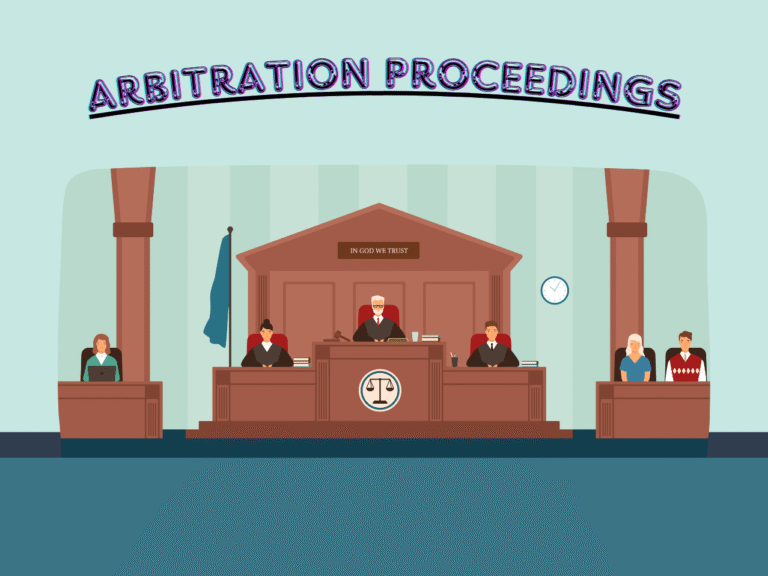Arbitration Proceedings: Resolve Disputes Outside the Courtroom
In today’s fast-paced business environment, long-drawn court battles can be time-consuming, expensive, and disruptive. Arbitration offers an effective alternative—providing a private, legally binding, and time-efficient method of resolving disputes. At AK Legal Mantra, we specialize in representing clients in arbitration proceedings, ensuring swift resolution while protecting your legal rights and business interests.

What is Arbitration?
Arbitration is a form of Alternative Dispute Resolution (ADR) where a neutral third party (called an arbitrator) hears both sides of a dispute and delivers a legally binding decision. It is commonly used in commercial contracts, construction disputes, intellectual property matters, employment conflicts, and international trade disagreements.
Unlike traditional court litigation, arbitration is private, less formal, and typically faster and more cost-effective.
When is Arbitration Applicable?
Arbitration usually takes place when:
- The parties have signed an arbitration clause in their contract
- Disputes arise in commercial agreements or business relationships
- There is a mutual decision to resolve issues outside court
- Mandated by arbitration institutions (like SIAC, LCIA, ICA, or ICADR)
- Even if a dispute begins in court, parties can agree to shift to arbitration for quicker resolution.
Benefits of Arbitration
- Confidentiality: Arbitration is private; sensitive information stays protected.
- Faster Resolution: Cases are typically resolved in months instead of years.
- Expert Arbitrators: Panels can include specialists familiar with the subject matter.
- Cost-Efficient: Lower legal and administrative costs compared to court litigation.
- Neutral Venue: Useful in cross-border disputes or international commercial arbitration.
How AK Legal Mantra Assists in Arbitration Proceedings
At AK Legal Mantra, we guide clients through the entire arbitration process—from drafting arbitration clauses to enforcement of arbitral awards. Our arbitration services include:
✔️ Drafting & Reviewing Arbitration Clauses
We ensure your contracts have well-drafted, enforceable arbitration clauses to avoid future ambiguity or jurisdictional issues.
✔️ Filing Arbitration Notices
We assist in initiating arbitration by drafting and sending formal notices of arbitration as per the Arbitration and Conciliation Act, 1996.
✔️ Representation in Arbitration Proceedings
Our experienced legal team represents clients before sole arbitrators or arbitral tribunals—presenting arguments, examining evidence, and managing legal strategy.
✔️ Settlement & Mediation Support
We help negotiate settlements during proceedings, if both parties agree to resolve the dispute amicably.
✔️ Enforcement or Challenge of Arbitral Awards
Whether you need to enforce an arbitral award or challenge it in court, we ensure full legal support during post-arbitration proceedings.
Types of Arbitration We Handle
- Domestic Arbitration (within India)
- International Commercial Arbitration
- Institutional & Ad Hoc Arbitration
- Online Dispute Resolution (ODR)
- Construction, Real Estate, and Contractual Disputes
FAQs
1. Is arbitration legally binding in India?
Yes. Under the Arbitration and Conciliation Act, 1996, the decision (award) passed by an arbitrator is legally binding and enforceable like a court decree.
2. Can a party challenge an arbitral award?
Yes. A party can file a petition under Section 34 of the Act to challenge the award in court, but only under limited grounds such as fraud or procedural irregularities.
3. How long does arbitration take to resolve?
Most arbitration cases are resolved within 6 to 12 months, depending on complexity and cooperation between parties.
4. What if there is no arbitration clause in the contract?
Parties can still mutually agree to opt for arbitration at the time of dispute. A written agreement to arbitrate is required to proceed.
5. Is arbitration cheaper than court litigation?
Generally, yes. Arbitration avoids court delays, reduces legal fees, and limits procedural complexities—making it cost-effective for many disputes.
